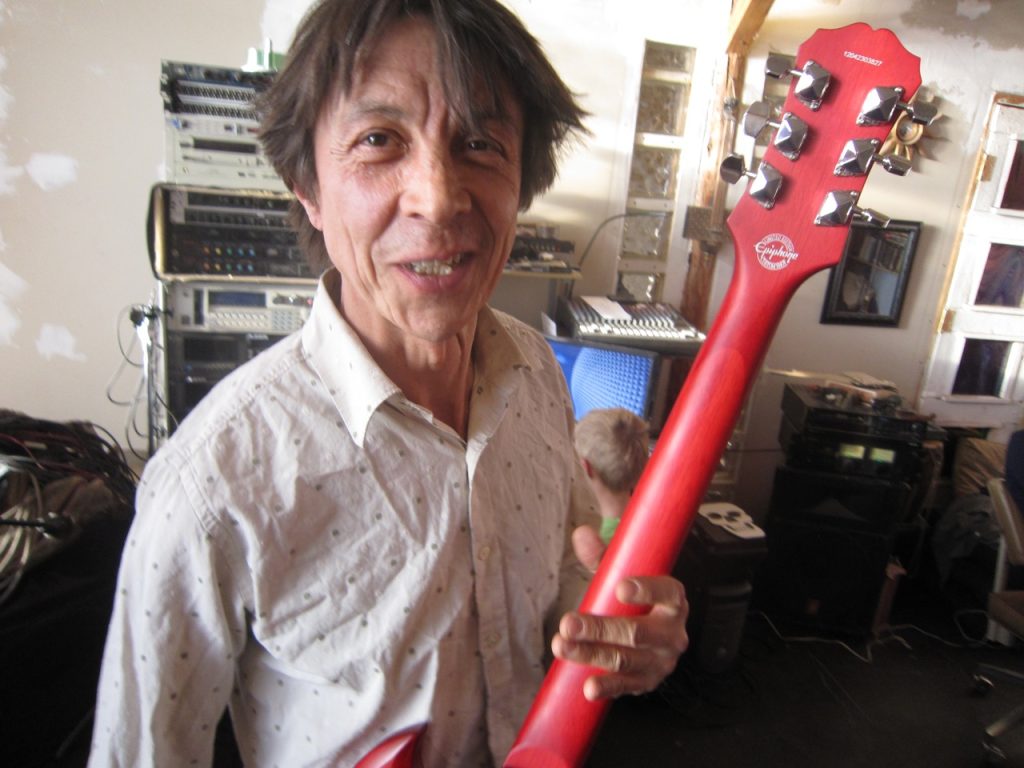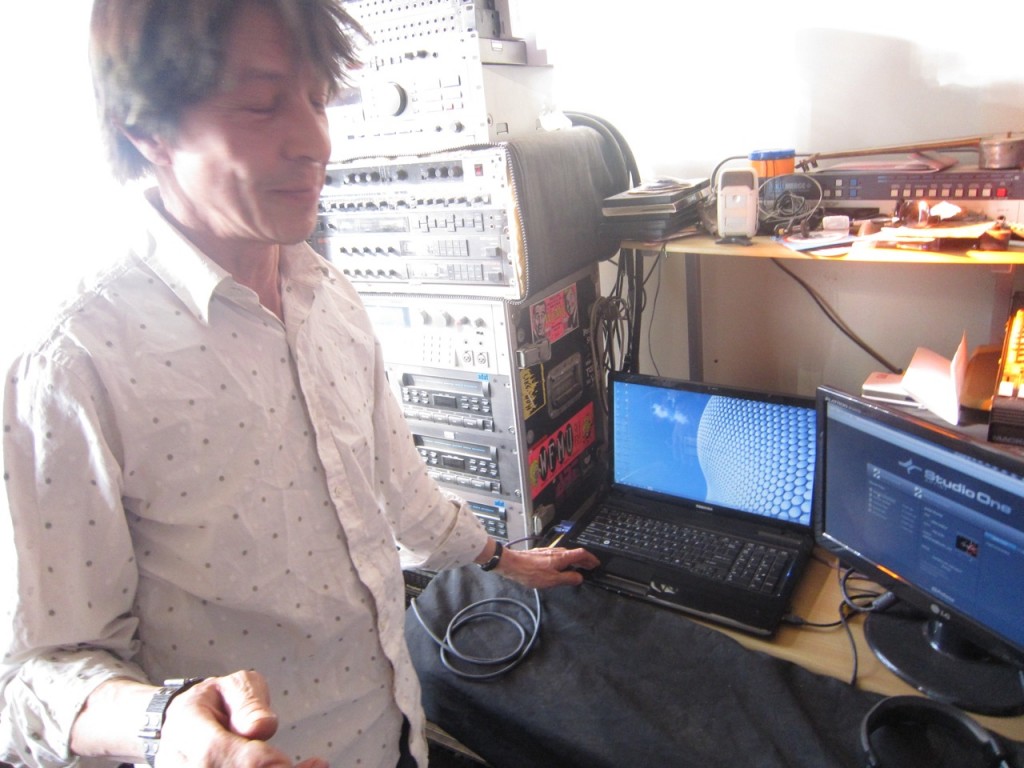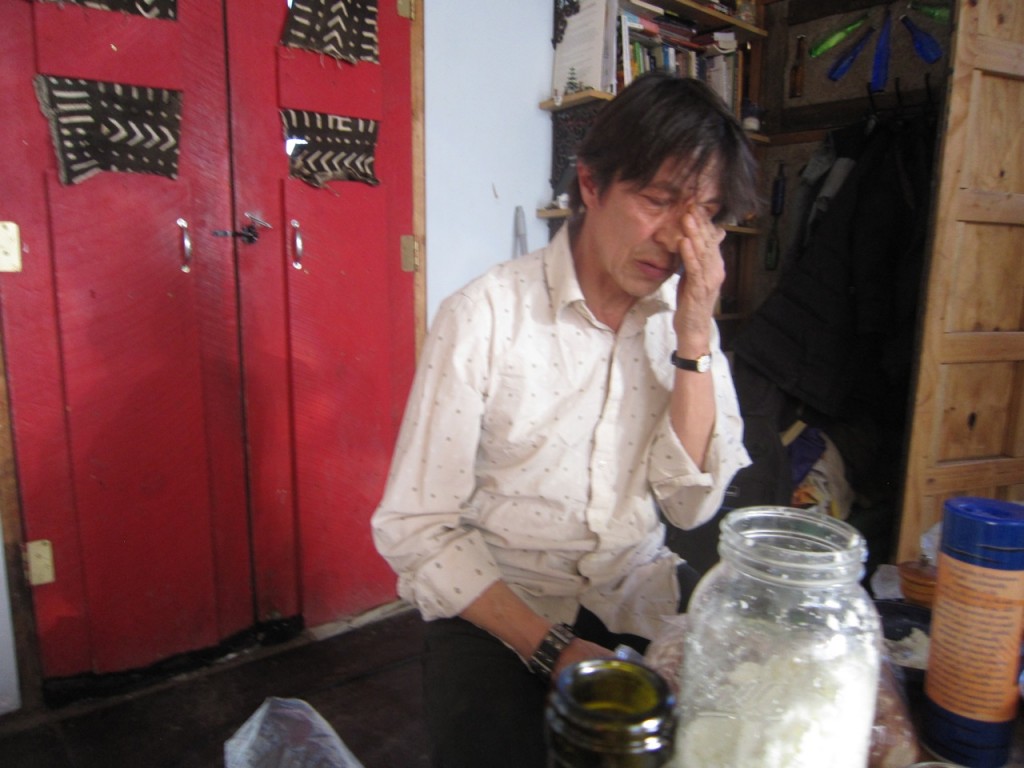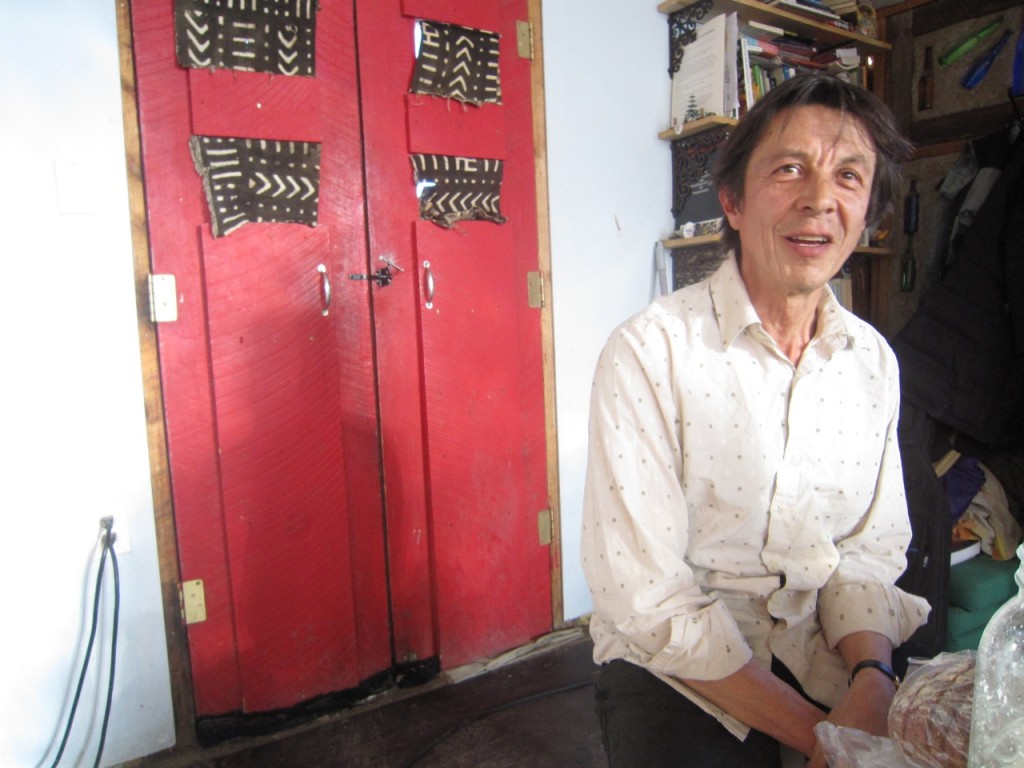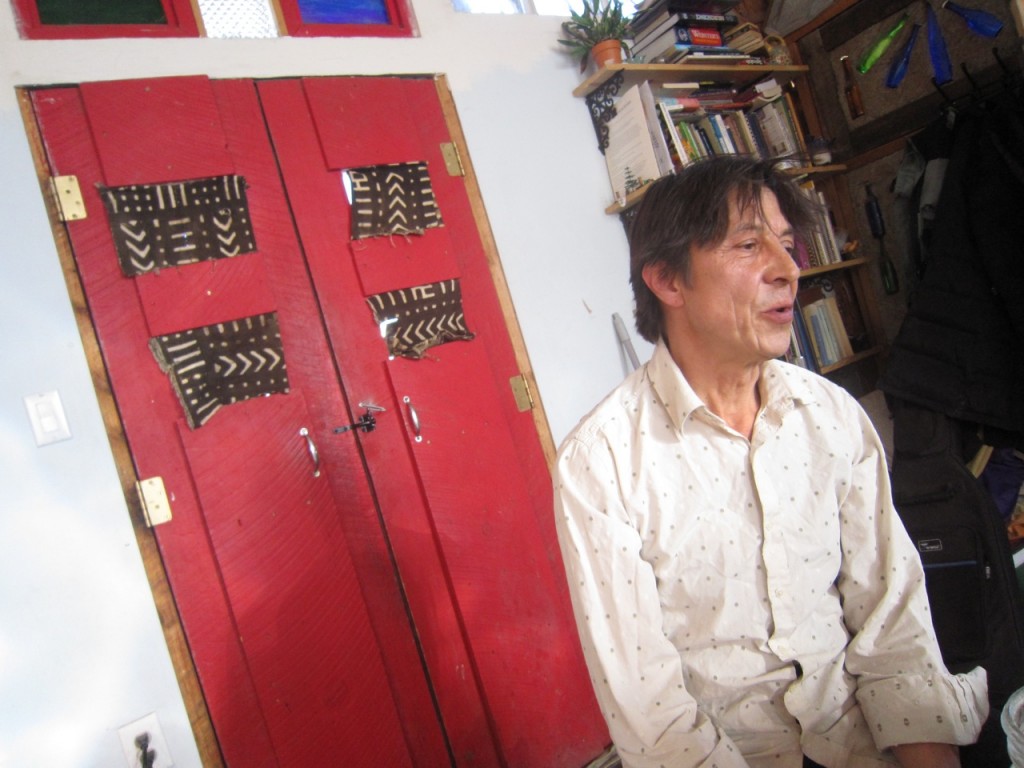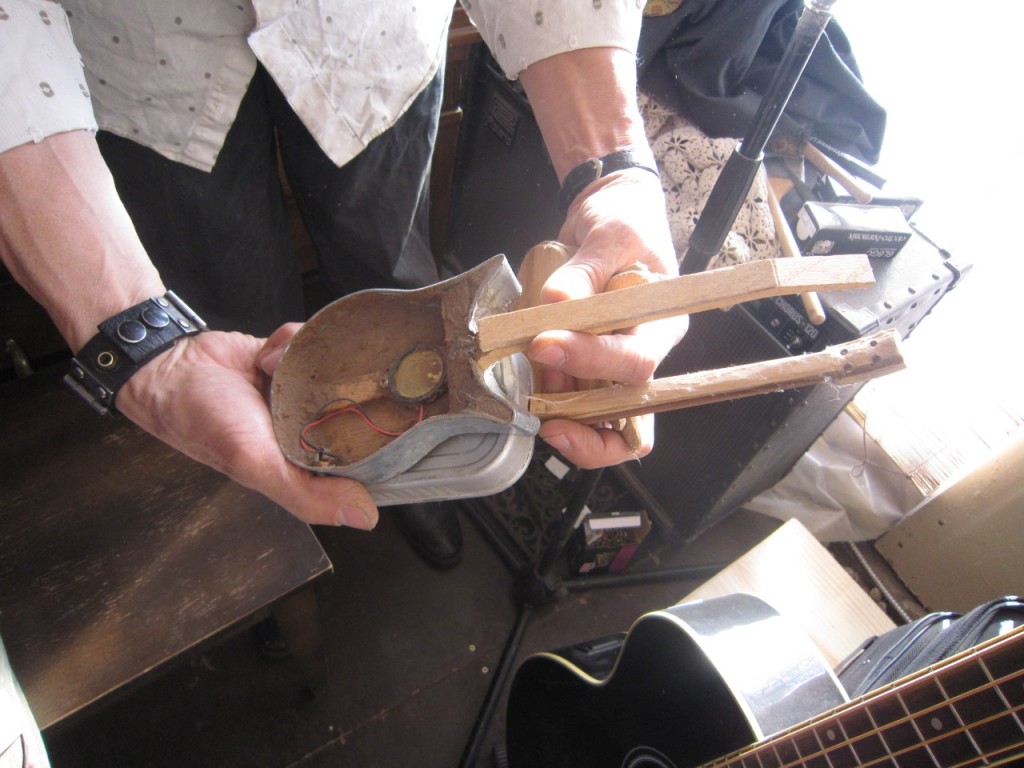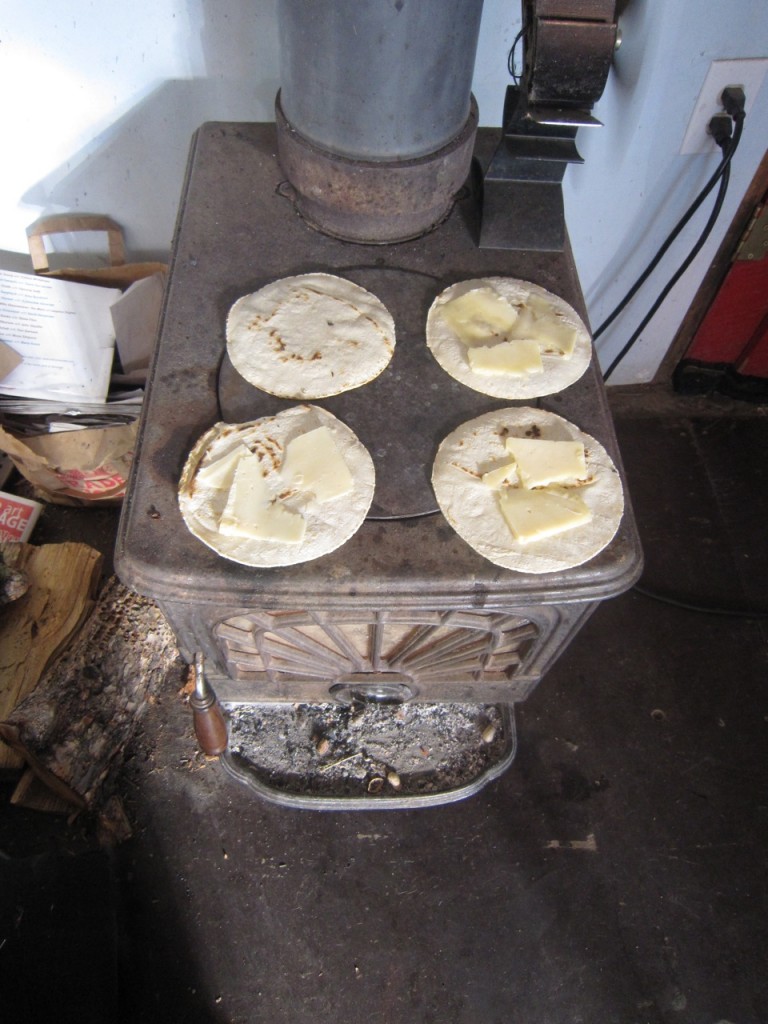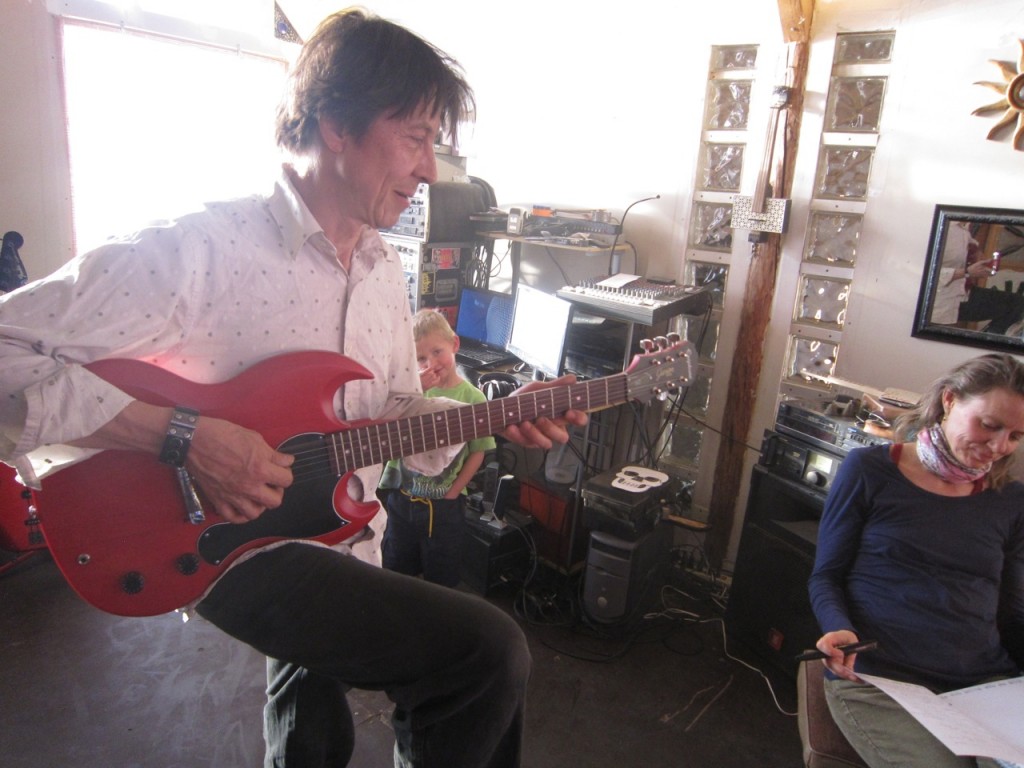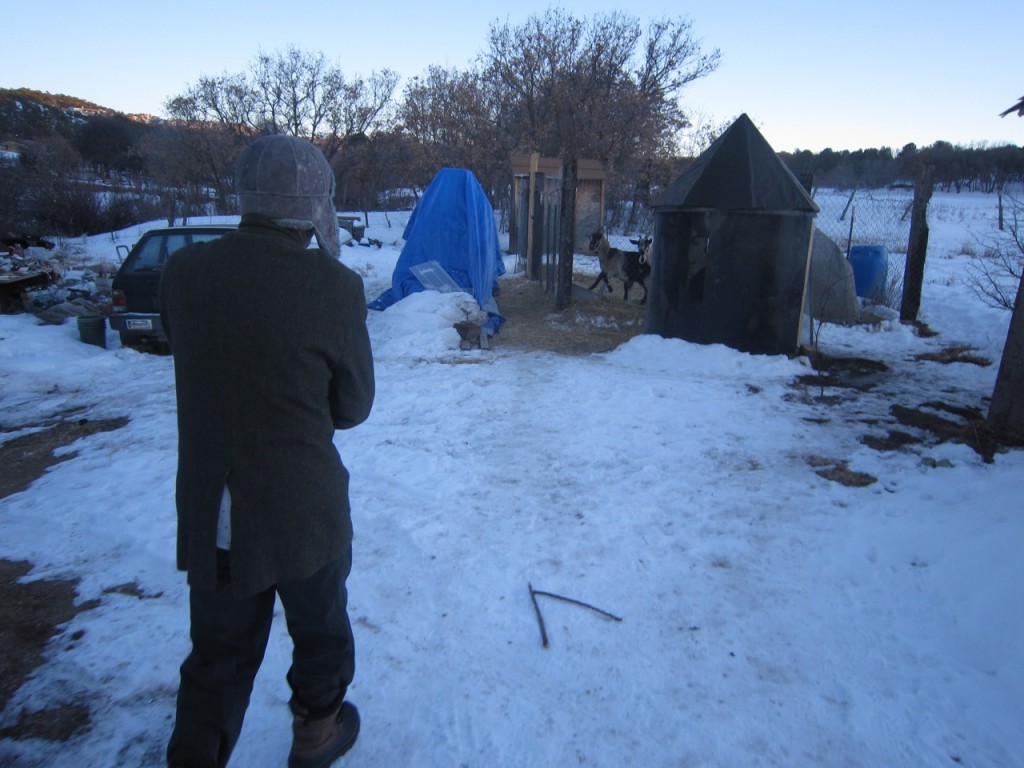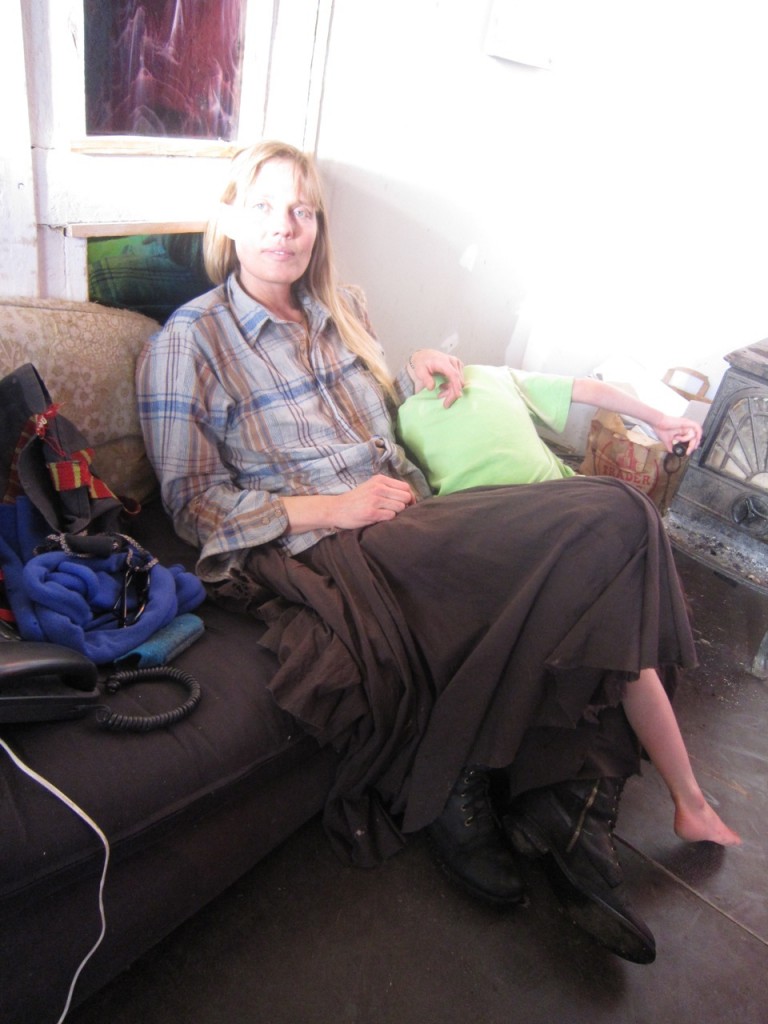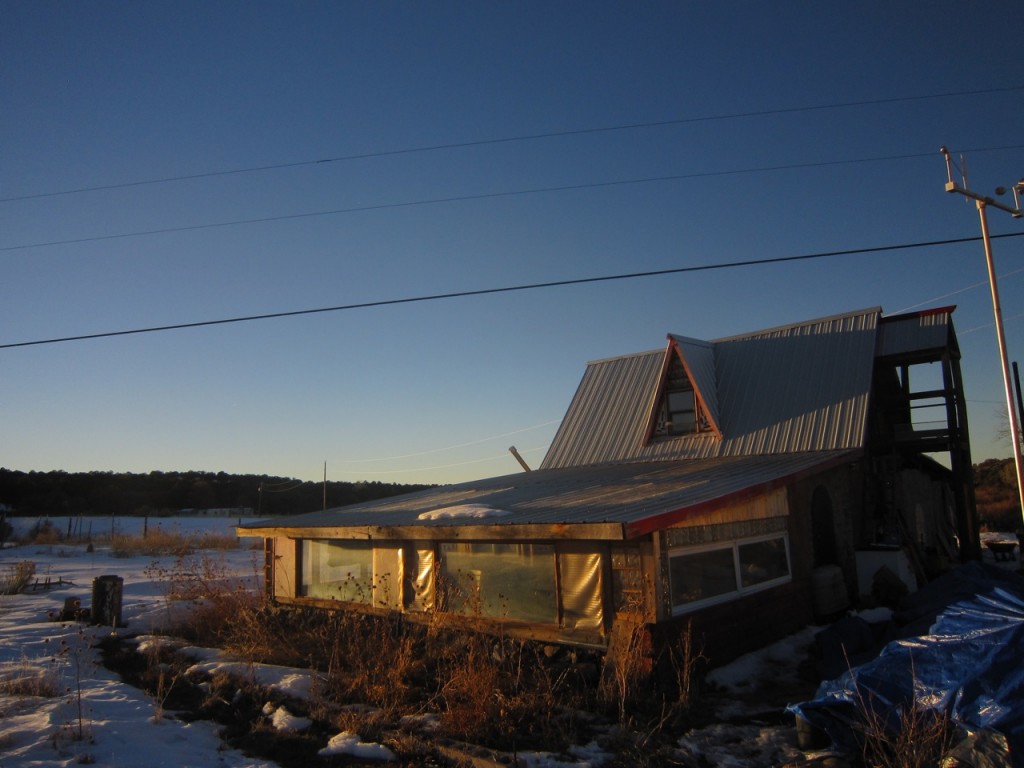Jan 20, 2013
Ojo Sarco, NM
a visit with Carlos Vivanco, guitarist
Today, on what we would have called back in SoCal, (alright, Southern California) a “Sunday drive” (well, not technically a “Sunday drive,” as a true “Sunday drive” has no real destination, but it is a SUNDAY!) Sonya & I are traveling the famous “high road to Taos,” destination: Ojo Sarco. We are here for quesadillas & conversation with avant-garde[1. AVANT-GARDE: the advance group in any field, especially in the visual, literary,or musical arts, whose works are characterized chiefly by unorthodox and experimental methods] guitarist Carlos Vivanco. (Though he isn’t comfortable with the term avant-garde I use it anyway; what else would I call a guitar-playing genius who started out shredding at 13 years old by a swimming pool on the roof-top of a Mexico City hotel, (in an “Irish” band no less!!), toured with trumpet legend Don Cherry, moved to Berlin & formed a number of bands there, played with Cecil Taylor in New York City, & then high-tailed it, with bassist & partner Mila Watson, to build a recording studio & goat ranch in a village that makes even Taos seem big)??
Enough said: this ranchero is avant-garde. A compulsive composer & occasional insomniac (who builds bizarre guitars in the night), Carlos is self-taught & eloquent; more than capable of telling his story himself! Let the conversation begin:
ORIGINS
(Born: Mexico City, 1955)
CARLOS: I asked to be sent to music school & they told me no. My mother, who was classically trained, did not want me to study in the classical system. My father did the opposite, he pulls out a beautiful guitar out of the closet, plays this beautiful riff, puts the guitar away & says, “You are prohibited to play this guitar!” & that was it.
THROAT CULTURE: And that’s what made you want to play the guitar! Because he said you couldn’t?
CARLOS: I thought, “We’ll see who wins!”
TC: Did you ever take any lessons?
CARLOS: NO. I never have taken a lesson. And I refuse if someone wants to try!
TC: What were you listening to as a kid growing up in Mexico City?
CARLOS: Classic music. Avant-garde through my father, & classic music through my mother.
TC: Your parents were getting this stuff on vinyl? Who were they turning you on to?
CARLOS: Stockhausen.[2. Karlheinz Stockhausen: 22 August 1928 – 5 December 2007) was a German composer, widely acknowledged by critics as one of the most important but also controversial (Power 1990, 30) composers of the 20th and early 21st centuries. Another critic calls him “one of the great visionaries of 20th-century music” (Hewett 2007). He is known for his ground-breaking work in electronic music, aleatory (controlled chance) in serial composition, and musicalspatialization.]
TC: Oh! classical avant-garde.
CARLOS: He also liked Coltrane.[3. John William Coltrane (also known as “Trane“; September 23, 1926 – July 17, 1967) was an American jazz saxophonist and composer.]
TC: So you were listening to this stuff?
CARLOS: To me it was normal. We also had Rossini[4. Gioachino Antonio Rossini (29 February 1792 – 13 November 1868) was an Italian composer who wrote 39 operas as well as sacred music,chamber music, songs, and some instrumental and piano pieces.] torture in the morning. We would wake up to ba-RUP-BUP-BUP!!! (Carlos sings some Rossinni) from these speakers in our bedrooms.
TC: So…what did YOU like?
CARLOS: What did I like when I was a kid? I liked a lot of things when I was a kid. I liked Cuban music, especially when they leave out the lyrics, because I thought the lyrics were so stupid. Anytime they shut up I just really, really like it, Son, Guarachas…all those rhythms.
TC: Any American music? Punk music?
CARLOS: To me, punk is not American. Sorry!
TC: No offense.
CARLOS: To me it’s very British, & Polish & German, but not American. I think that the kids on St. Mark’s Place who call themselves punks are kids from “Jersey” who go to “Trash and Vaudeville”[5. Trash and Vaudeville is actually two stores, one on top of the other, located at 4 St. Mark’s Place in Manhattan, New York. It is associated with the clothing styles of punk rock and various other counter culture movements] & they buy their outfits there & they turn into punks, but they don’t have no idea what these people were feeling out in the industrial sides, suffering with no culture, no nothing! only your granddad’s or Winston Churchill’s so fuck that!
TC: So punk made it to Mexico City.
CARLOS: Absolutely! There’s more punks there than in a lot of places because they have the same feelings, they come from that very deep poverty.
TC: I’ve always thought that about your music, that it comes from a punk place, self-expression over classical training.
CARLOS: Yeah. It’s not like I’m trying to do “Avante-garde!” that’s so pretentious. I feel fine always as “kind of crazy.” I can only play three chords.
EUROPE
(late seventies-early eighties)
TC: So you went with a band to Europe?
CARLOS: I went by myself with the plans of creating a band. And then the Europe thing led to New York, as you gentrify a place, it becomes this other place & you cannot afford it, so you have to leave it, you move on to the next place & then we gentrified the lower-east side.
TC: What year did you move to Europe?
CARLOS: I went several times, back & forth, it was ’80, early 80’s, late 70’s.
TC: Who did you see there?
CARLOS: I saw Blixa Bargeld,[6. Blixa Bargeld (born Hans Christian Emmerich on 12 January 1959) is a composer, author, actor, singer, musician, performer and lecturer in a number of artistic fields. He is best known for his studio work and tours with the groups Einstürzende Neubauten and Nick Cave and the Bad Seeds.] Einstürzende Neubauten,[7. Einstürzende Neubauten is a Germanindustrial band, originally from West Berlin, formed in 1980. The group currently comprises Blixa Bargeld (lead vocals, guitar, keyboard), Alexander Hacke (bass, guitar, vocals), N.U. Unruh (custom-made instruments, percussion, vocals), Jochen Arbeit(guitar and vocals), and Rudolf Moser (custom-built instruments, percussion, and vocals)] Malaria!, [8. Malaria! was an experimental electronic band from Berlin formed in 1981 by Gudrun Gutand Bettina Köster following the dissolution of Mania D with Karin Luner, Eva Gossling, later Die Krupps and Beate Bartel (of Liaisons Dangereuses). Other members included Manon P. Duursma, Christine Hahn, and Susanne Kuhnke (also a member of Die Haut). They are most often associated with Neue Deutsche Welle and post-punk.] Nick Cave, [9. Nicholas Edward “Nick” Cave,born 22 September 1957, is an Australian musician, songwriter, author, screenwriter, composer and occasional film actor] D.A.F., [10. Deutsch Amerikanische Freundschaft or D.A.F. is an influential Germanelectropunk/NDW band from Düsseldorf, formed in 1978 featuring Gabriel “Gabi” Delgado-López (vocals), Robert Görl (drums, percussion, electronic instruments), Kurt “Pyrolator” Dahlke (electronic instruments), Michael Kemner (bass-guitar) and Wolfgang Spelmans (guitar). Kurt Dahlke was replaced by Chrislo Haas (electronic instruments, bass guitar, saxophone) in 1979.] all these people.
MEANWHILE, BACK IN MEXICO
CARLOS: I was a full-time musician working in Mexico. My first time working was at 13 years old. The Hotel Alameda, it was a beautiful hotel, it doesn’t exist anymore, it fell in the earthquake of 1985. It was a beautiful hotel & on the penthouse they had these two swimming pools & a stage in the center. It was just awesome to play there, they pay you a lot of money & they treated you really nice.
TC: Were you playing solo?
CARLOS: No, I was playing with a bunch of Irish people.
TC: Irish?
CARLOS: Yeah, they were touring Latin America & their guitar player died. So they had to look for a new guitar player.
TC: You were thirteen?
CARLOS: Yes, I went to the audition with a friend who was older, & I got bored & I really wanted to go home because it was late & my parents were going to ground me for being out so late, so my friend let me play his guitar, & then I played & then this pretty girl came in & said, “Excuse me, do you mind if we take this kid with us?” & that was that!
TC: So you were making a little money as a teenager. As a musician, that must feel pretty good.
CARLOS: Yes, but it doesn’t feel good when they tell you how to dress, how to comb your hair, & I didn’t like that. So there was a point where we were hired to a company in Mexico to do nightclub work & we were signed to a subsidiary of Capitol Records & the contract is like a “fuck you, fuck you, fuck you” kind of thing & we didn’t know & then we were like “shit, we are really screwed here,” so these guys just changed the name of the band & moved out of Mexico & I was left there, the only one Mexican.
TC: What did you do?
CARLOS: I became a flight attendant! I was gone a lot, & eventually they let me go.
TC: Did you ever have any good experiences with record labels?
CARLOS: No.
TC: Anything even close?
CARLOS: No.
ATRAZ DEL COSMOS
(behind the cosmos)
CARLOS: One band I had a really wonderful experience with was called Atraz del Cosmos, & that is “behind the cosmos,” & why? because the Cosmos is a cinema that was around the corner from where we rehearsed!
TC: That’s a good name.
CARLOS: The main organizer is named Henry West, & he invites Don Cherry to come & play with us.
TC: Whoa, whoa, wait a second…
CARLOS: And he did it. He came to Mexico & we toured Mexico with Don Cherry & to me that was the high point of my entire existence.
TC: Wow!
CARLOS: It was a very great opportunity. Later on I became friends with Cecil Taylor.[11. Cecil Percival Taylor (born March 25, 1929) is an American pianist and poet.Classically trained, Taylor is generally acknowledged as one of the pioneers of free jazz. His music is characterized by an extremely energetic, physical approach, producing complex improvised sounds, frequently involving tone clusters and intricate polyrhythms.] I was playing in a band The Devil’s Breakfast that I had in New York City & the sax player, Elliot Levin introduced me to Cecil. Cecil would invite people to play on Saturdays. You would bring your instrument & jam & he would throw you out if he didn’t like what you were doing or he didn’t think it was honest…he’s very hard core.
TC: He is?
CARLOS: Oh, of course. I learned a lot from that. To play with your heart.
MILA: Cecil is such an extreme, intense human.
MEANWHILE, BACK IN MEXICO
(part 2)
CARLOS: I have been a street musician all my life. I had a band in Mexico City with permit #0001, the first permit in history! to play in the streets. The name of the band was Queso Callejero, the “joint of the street.”
TC: Queso?
CARLOS: That’s the slang for joint. We have like 150 names for a joint. We didn’t have time to rehearse as we were all so busy playing with other bands so what we did was, get together down town, play 2 hours & read music by somebody else & just give it the flavor of whatever we want. We would play Coltrane, all these classic jazz players & it was super-profitable! That was a long time ago, 1977. Around the time when I was leaving Mexico, I played with another band called Queso Sagrado —
TC: Sacred Cheese!
CARLOS: …but that was totally avant-garde stuff.
TC: Not on the streets?
CARLOS: No, that was in concert halls. In Mexico the concert halls are outstanding. Most of my friends in Mexico right now are under a grant for the arts, & they receive between $600 & $2000 a month with no taxes. I just did a double-album down there with a friend, Alex Eisenring,[12. Elliot Shalom Levin: Jazz flute and saxophone player (born in Philadelphia, PA, 23 October 1953).] he is a great composer, he plays with a band called DECIBEL.
MILA: And after all of this, Carlos is a ranchero!
CARLOS: Now, I am a ranchero! We have been in ‘Sarco almost 11 years.
TC: This is pretty far from the beaten path.
CARLOS: When we moved here there was nothing. It was crazy the way we did it, there was no water, no nothing, February 7th, 2002.
THE JINGLE BUSINESS
(NYC)
CARLOS: I was busy trying to be successful in the jingle business.
TC: You were working in the jingle business? Straight up composing for TV commercials, cartoons?
CARLOS: Coca-Cola, Pepsi Cola, AT&T, MCI…
TC: You were trying to make money?
CARLOS: NO, I was not trying to make some money, I was just trying to prove that good, avant-garde music could be on the TV.
TC: We’ve all thought that. & sometimes it happens.
CARLOS: I did it. Now I go back to New York once a year, I stay a month & I play with a lot of people. Last year I played with Liquid Liquid,[13. Liquid Liquid is a New York City post-punk, post-disco band, originally active from 1980 to 1983.] the West Philadelphia Orchestra,[14. West Philadelphia Orchestra: Overflowing joy’ and ‘reckless abandon’ are what we aim to achieve with our music. We open your ears with our compositions, arrangements, and improvisations, AND we get you dancing.] & I play also by myself. Some people are no longer there & some disappear so every year there is less & less.
TC: Would you like to play more around here?
CARLOS: Yes, if there were more stages. I would love to play twice a week & make my living that way. It is the right of every human to make a living doing what they love. It sounds very communist, it is communist. I tried to do a little justice in the jingle business, I hired street musicians & paid them $1200 a session when the other studios were paying $80 an hour. I didn’t care if it was 5 minutes or 10.
TC: Sounds communistic.
CARLOS: The heart is red & it’s pumping & it beats on the left side.
NIGHTSHADE
(with Mila Watson)
MILA: Nightshade started when we got Bella, our lead singer, in the band. We have some of Bella’s compositions & a lot Carlos’ compositions. She put words to some of our pieces, things originally with no words. She lives about 7 miles away.
TC: That makes it easy.
MILA: It’s hard to find people that you love who are so talented, it took a while. We went for quite a while without having a steady singer.
TC: Did you still play?
MILA: We’ve always been playing, even as a duo, sometimes with just a drummer. Sometimes more consistently than other times. We’ve been busy doing other things…school, building this house.
TC: I was really excited that Carlos had a new band to bring to Taos. Well…it’s not Carlos’ band, it’s your band, too.
MILA: Well…mostly him…he’s the main composer.
TC: But, you all work together to create the music.
MILA: Yeah, we all work together. We all put our artistic input in. I have a really good feeling we could last for a long time.
TC: Do you play bass?
MILA: Yes, I started out with guitar. but we needed a bass player. I love playing bass. It’s a good place for me. I want to expand more, ultimately. Carlos just got me a violin. I would love to do a bowed bass or cello, I love that sound.
TC: Do you have an upright bass?
CARLOS: I wish!
MILA: One of these days.
TC: Do you sing in Nightshade?
MILA: No, I’m better behind the bass. I grew up in Embudo, in the middle of nowhere. I didn’t start playing until a lot later, but I always had music envy. I envied musicians…I loved music so much. It took me a while to figure out that I could do it, too. For me, my love of music was actually my first stage of learning music, because I had the ability to be moved by music. So then I could move with music & now I can make music that moves.
BACK TO TAOS
aaaahhhhh…a beautiful afternoon in Ojo Sarco comes to an end. Thanks to Carlos & Mila for the quesadillas, goat cheese, & wine.

